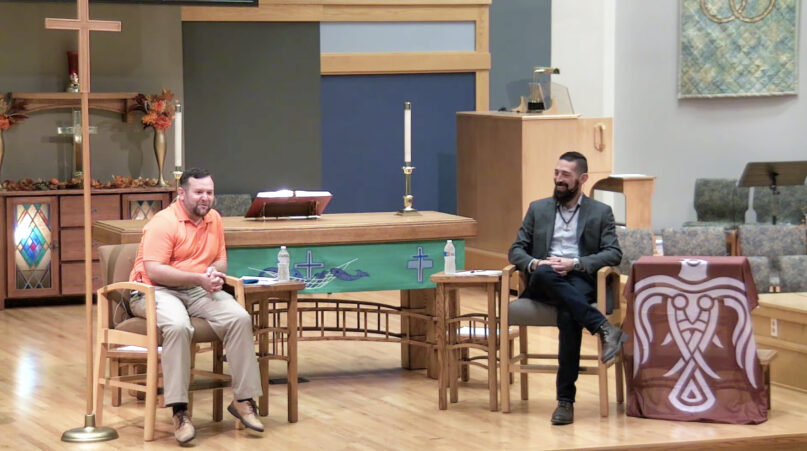(RNS) — A Pagan and a pastor walk into a church.
It’s not the setup to a joke.
It’s just another Thursday evening for the Rev. Ethan Stark of Heathens Against Hate and the Rev. Andy Behrendt of Trinity Lutheran Church.
The two clergymen — Stark, ordained by the international heathen organization The Troth, and Behrendt by the mainline Evangelical Lutheran Church in America — hosted “A Pagan and a Pastor: A Necessary Conversation” Thursday evening (Sept. 30) at Trinity in Waupaca, Wisconsin. The duo answered some frequently asked questions about their faiths and addressed misperceptions each tradition has about the other.
It’s a conversation they are scheduled to repeat in October at the Parliament of the World’s Religions, which will be held virtually for the first time since it initially convened at the 1893 World’s Columbian Exposition in Chicago.
RELATED: The parliament of religions is more than a big ‘pat on the back’ for faith
They hope such conversations will help encourage understanding and better relations between Christian and pagan faith traditions.
“The more we can learn about people of other faiths or even non-faith, the more we appreciate about our own tradition,” Behrendt said at Thursday’s event, which was streamed on Trinity’s YouTube channel.
Behrendt’s path to his Christian faith was pretty straightforward: His dad was a Lutheran pastor before him, he said. For him, the church was always a place of love and acceptance, though he noted that has not been everyone’s experience.
Stark was raised conservative Jewish in Israel but said he realized as a teenager he felt more connected to the divine in nature than he did while reading from Scripture at his own bar mitzvah. That eventually led him to paganism and heathenry — neither of which, he explained, should be viewed as derogatory terms.
“We are pagan, we’re proud as such, and it’s only a pejorative depending on who uses the term,” Stark said.
The two met about three years ago when Stark and his wife, who is a Christian, were planning an interfaith wedding and asked Behrendt to co-officiate.
The pastor was a little nervous to do it at first.
Behrendt said he didn’t know much about paganism. He’d lumped “godless” pagans in with atheists, which he admitted is ironic: Some pagans — like heathens, who honor the gods from pre-Christian Norse and Germanic religions — worship many gods.
Stark said he has encountered fear from Christians before.
He also noted it cuts both ways. He’s encountered “a lot of anti-Christian sentiment in paganism,” he said.
Many people come to the pagan community from Christianity because they do not feel welcome there, according to Stark. That includes LGBTQ people and women who are barred from leadership in many conservative Christian traditions, he said. (The ELCA ordains both.)
Behrendt apologized, noting, “We have the part about needing a savior right because we definitely are flawed and we make a lot of mistakes. Jesus was so thoroughly, thoroughly about loving people, and if he did get frustrated with somebody, it was almost entirely because they were part of the religious establishment and because of their mistreatment of others.”
RELATED: Heathens condemn storming of Capitol after Norse religious symbols appear amid mob
For the pastor, it was wonderful getting to know somebody like Stark — who, it turned out, was not at all threatening — and to better understand his beliefs, Behrendt said. Some of those beliefs, like their concepts of divinity, are very different, he added. But they care deeply about a number of the same issues, too.
For the pagan, it comes back to an Icelandic saying: “All power to all relations.”
“We’re all interconnected. We’re inseparable, whether we’d like to believe it or not, and that speaks both to humanity and to nature,” Stark said.
That extends to people with differing beliefs, too, he said.
“It therefore is almost, like, incumbent upon us to approach others in a better understanding that regardless of a difference of one God or many gods, we are still — at least to us theists — children of the divine, be it a single parent or a divine family that kind of watches over you,” Stark said.





